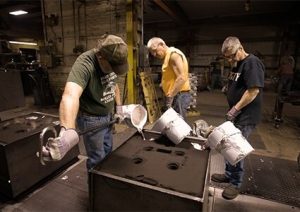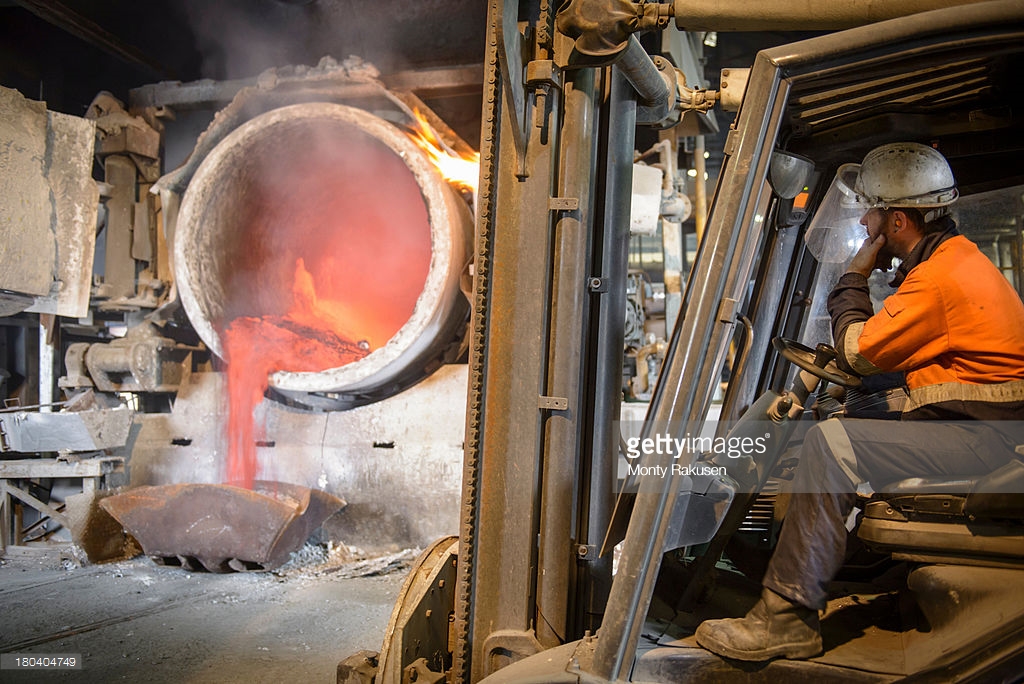How to Leverage Aluminum Castings for Lightweight Manufacturing Solutions
Wiki Article
Checking Out the Innovative Methods Utilized in Modern Aluminum Foundries
Modern aluminum foundries are going through a considerable change through the fostering of cutting-edge strategies. Advanced casting techniques, clever automation, and lasting methods are reshaping manufacturing procedures. These improvements not only boost performance however also address ecological worries. As the market evolves, the assimilation of digital technologies plays an important duty. Comprehending these changes is essential for realizing the future of aluminum manufacturing and its implications for international markets. What lies in advance in this dynamic field?Advanced Casting Techniques

In addition, developments in thermal control and mold and mildew style have actually added to even more regular casting results. These innovations allow for far better control of cooling rates, minimizing problems and boosting mechanical buildings. Therefore, manufacturers can produce lightweight yet long lasting parts, meeting the boosting demands of different markets, consisting of automotive and aerospace, for high-performance aluminum parts.
Smart Automation and Robotics
The combination of smart automation and robotics in aluminum foundries notes a significant development in manufacturing efficiency. These innovations allow accuracy and consistency in manufacturing processes, dramatically lowering human mistake and improving safety. Automated robot systems take care of recurring tasks, such as molding, pouring, and air conditioning, permitting human drivers to concentrate on even more facility obligations that require essential thinking and oversight.In addition, wise sensing units and AI-driven analytics offer real-time information monitoring, facilitating predictive maintenance and decreasing downtime. This results in optimized source allowance and enhanced power usage, adding to overall sustainability in production.
Additionally, the adaptability of robot systems permits quick changes to changing manufacturing demands, enhancing adaptability in manufacturing. As foundries increasingly adopt these sophisticated modern technologies, they not just boost operational efficiency but likewise position themselves as leaders in advancement within the steel casting market.
Additive Production in Foundries
Changing typical manufacturing approaches, additive production is changing aluminum foundries by making it possible for the production of intricate geometries that were formerly unattainable. This strategy permits the layer-by-layer building and construction of parts, substantially lowering product waste and shortening production times. Consequently, foundries can produce intricate layouts that boost efficiency and performance, catering to the expanding needs of different industries.Moreover, additive production promotes fast prototyping, enabling engineers to examine and repeat styles quickly. This agility not just accelerates the growth cycle however also aids in determining potential concerns before major production starts. The combination of advanced products and processes in additive production even more boosts the mechanical buildings of aluminum parts, advertising advancement in product style. Consequently, aluminum foundries that embrace these techniques place themselves at the forefront of sector advancements, making certain competitiveness in an ever-evolving market landscape.
Sustainable Practices and Recycling
Lasting techniques in aluminum foundries are increasingly concentrated on improving reusing processes and embracing environmentally friendly casting methods. These technologies aim to minimize waste and power intake while optimizing the use of recycled materials. As the market progresses, the assimilation of sustainability right into production methods becomes necessary for fulfilling ecological standards and consumer demands.Recycling Process Improvements
As industries increasingly recognize the environmental effect of waste, aluminum foundries are embracing ingenious reusing procedure enhancements to improve sustainability. These innovations concentrate on reducing power intake and maximizing material recovery. As an example, many foundries are executing closed-loop systems that recycle scrap aluminum created throughout manufacturing, decreasing waste and lowering the demand for virgin products. Advanced arranging innovations, such as automatic optical sorting, improve the separation of different aluminum qualities, raising the effectiveness of the recycling process. Additionally, some foundries are making use of hydrometallurgical approaches to recuperate aluminum from complicated waste streams. By integrating these improvements, aluminum foundries not only add to a circular economy but also reduce their carbon footprint, straightening with worldwide sustainability objectives.Eco-Friendly Casting Techniques
While standard casting methods frequently entail substantial energy consumption and product waste, aluminum foundries are significantly taking on eco-friendly casting strategies that focus on sustainability. Methods such as low-pressure die casting, which minimizes air discharges, and the use of water-based mold and mildew releases add to decreased ecological impact. In addition, developments in 3D printing modern technology enable the development of intricate molds with much less material waste. Numerous foundries are also executing closed-loop systems that recycle water and aluminum scrap, additional decreasing resource intake. By embracing renewable resource resources, view website such as solar and wind power, these centers improve their sustainability initiatives. In general, the fostering of environmentally friendly techniques in aluminum casting not only benefits the environment but likewise advertises financial performance and innovation within the industry.Improved High Quality Control Actions
Improved top quality control measures in aluminum foundries are increasingly dependent on advanced assessment technologies and real-time monitoring systems. These advancements allow makers to identify issues early and assure regular item high quality. By incorporating these tools, foundries can substantially boost their functional effectiveness and minimize waste.Advanced Evaluation Technologies
Advanced evaluation technologies play a vital role in guaranteeing the quality and integrity of aluminum spreadings. These innovative techniques include non-destructive screening (NDT) strategies such as ultrasonic screening, radiographic testing, and eddy existing assessments. Each technique allows for thorough assessment of castings without compromising their architectural stability. Advanced imaging techniques, such as computed tomography, provide an extensive sight of internal attributes, making it possible for the detection of issues like spaces and inclusions. In addition, automated optical evaluation systems boost precision by using high-resolution video cameras and machine discovering algorithms to assess surface high quality. By executing these innovative evaluation modern technologies, aluminum foundries can efficiently decrease problems, making certain that castings satisfy rigorous industry requirements and customer demands.Real-Time Surveillance Systems
As makers endeavor for excellence in aluminum casting, real-time tracking systems arise as a critical enhancement in top quality control measures. These systems utilize sophisticated sensing units and data analytics to constantly track essential parameters during the casting procedure, such as pressure, temperature level, and alloy make-up. By providing immediate comments, they allow drivers to determine variances from ideal conditions and make timely adjustments. This positive technique not just decreases defects but also improves overall efficiency and decreases waste - Wisconsin Aluminum Foundry. In addition, assimilation of real-time information right into production management systems helps with much better decision-making and improves traceability. Subsequently, real-time surveillance systems play a crucial duty in keeping high requirements of top quality in modern-day aluminum foundries, making certain that items satisfy strict sector requirementsDigital Twin Modern Technology for Optimization

The assimilation of electronic twin modern technology permits foundries to examine various circumstances without interfering with real manufacturing. This ability promotes a positive technique to maintenance and resource management, ultimately reducing waste and lowering functional prices. Furthermore, the innovation aids in process optimization by permitting designers to picture the impacts of modifications in real-time, guaranteeing higher quality end results. As an outcome, aluminum foundries embracing digital twin technology are placed to attain higher effectiveness and competitiveness in an increasingly requiring market.

Market 4.0 and IoT Integration
The adoption of electronic twin technology in aluminum foundries becomes part of a broader motion in the direction of Market 4.0, identified by the integration of the Net of Points (IoT) into producing procedures. This integration allows real-time surveillance and data collection from different equipment and equipment, causing boosted operational efficiency. Sensors installed in equipments gather vital information, which is analyzed to enhance manufacturing operations and predict maintenance needs.Moreover, IoT tools promote communication between different production stages, enabling for smooth control and minimizing downtime. By leveraging cloud computing, foundries can store and analyze vast quantities of data, enabling more enlightened decision-making. This modern technology additionally sustains remote administration, where drivers can supervise processes from anywhere, view publisher site improving responsiveness to manufacturing obstacles. On the whole, the blend of Market 4.0 and IoT within aluminum foundries is transforming traditional techniques, making them extra dexterous and receptive read to market needs.
Often Asked Concerns
What Are the Main Advantages of Aluminum Over Various Other Metals?
Aluminum offers numerous benefits over other steels, including its light-weight nature, outstanding corrosion resistance, high thermal and electric conductivity, malleability, and recyclability, making it a preferred selection for different applications across several industries. - Aluminum CastingsJust How Do Modern Foundries Manage Hazardous Materials?
Modern foundries handle dangerous products through rigorous security protocols, progressed filtration systems, and reusing methods. Routine training warranties workers recognize best techniques, while keeping track of systems detect and alleviate potential dangers to keep a safe workplace.What Is the Regular Life-span of Aluminum Castings?
The common life-span of aluminum spreadings ranges from 20 to 50 years, relying on factors such as environmental problems, use, and maintenance. Correct treatment can extend their toughness and efficiency significantly gradually.Exist Any Health And Wellness Dangers Connected With Aluminum Foundry Work?
Yes, aluminum foundry work presents wellness threats, including respiratory problems from breathing in fumes and dust, skin inflammation from call with liquified steel, and possible exposure to dangerous chemicals. Correct safety steps are important to minimize these threats.How Do Foundries Make Sure Employee Security in High-Temperature Environments?
Shops apply strenuous security procedures, including safety gear, temperature tracking systems, and routine training. These actions ensure that employees are furnished to manage high-temperature atmospheres, reducing dangers and promoting a more secure office.
Many sophisticated casting methods have arised in aluminum foundries, changing standard processes. Lasting practices in aluminum foundries are increasingly focused on enhancing reusing procedures and embracing environmentally friendly casting techniques. Several foundries are implementing closed-loop systems that reuse scrap aluminum produced during manufacturing, lessening waste and lowering the requirement for virgin materials. While typical casting techniques commonly involve substantial power consumption and material waste, aluminum foundries are significantly embracing eco-friendly casting methods that prioritize sustainability. While lots of sectors are progressively taking on digital modern technologies, aluminum foundries are leveraging digital twin innovation to boost operational performance and optimize manufacturing processes.
Report this wiki page